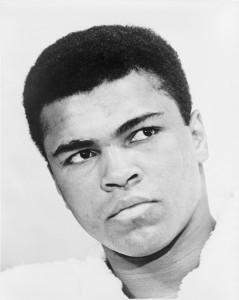
Muhammad Ali
Muhammed Ali was born Cassius Clay in Louisville, Kentucky. From 1956-60, Clay fought as an amateur (winning 100 of 108 matches) before becoming the light-heavyweight gold medalist in the 1960 Olympics. Financed by a group of Louisville businessmen, he turned professional and by 1963 had won his first 19 fights. In 1964 he won the world heavyweight championship with a stunning defeat of Sonny Liston. Immediately afterwards, Clay announced that he was a Black Muslim and had changed his name to Muhammad Ali.
In 1967, after defending the championship nine times within two years, Ali was stripped of his title for refusing induction into the U.S. Army based on religious grounds. His action earned him both respect and anger from different quarters, but he did not box for three and one-half years until, in 1971, he lost to Joe Frazier.
A few months later, the U.S. Supreme Court affirmed his right to object to military service on religious grounds and Ali regained the title in 1974 by knocking out George Foreman in Zaire, Africa. Ali defended his title 10 times before losing to Leon Spinks in 1978. When he defeated Spinks later that same year, he became the first boxer ever to regain the championship twice.
Famous for his flamboyant manner, his boasting predictions of which round he’d defeat his opponent, and his doggerel verse (“float like a butterfly, sting like a bee”), he was also recognized as one of the all-time great boxers with his quick jab and footwork. He compiled a career record of 56 wins, 5 losses, and 37 knockouts, before retiring in 1981. During the 1960s and 1970s he was arguably the best-known individual in the entire world due not only to his controversial career but also to his travels and deliberate reaching out to the Third World.
In the 1980s it was revealed that Ali was suffering from a form of Parkinson’s disease. He made occasional appearances to the acclaim of an admiring public, including the lighting of the flaming cauldron to signal the beginning of the 1996 Summer Olympics in Atlanta.